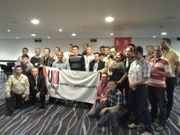Prosegur rejects offer to meet with UNI Property Services' unions

Over 30 trade union leaders from 7 countries in Latin America and Europe discussed the July firing of 327 strikers in Prosegur Paraguay.
The union leaders requested to meet with Prosegur management in person about the firings in Paraguay and to demand reinstatement of these strikers. The company refused to meet. Therefore the union leaders developed a plan to uphold workers’ rights everywhere Prosegur operates. The trade unionists learned from each other that the events in Paraguay are not isolated. A number of years ago, before the union was as strong as it is today, Prosegur fired 800 strikers in San Paolo, Brazil for standing up for their rights by striking. In 2000, a mass firing occurred when security guards struck in Chile to improve their working conditions. What seems indisputable is that if Prosegur believes it can get away with punishing workers who stand up for their rights by engaging in a lawful strike, they will do so.
The events in Paraguay are stark. Having been invited back to the bargaining table at the end of July by the Minister of Labour, the union, SITEPROPASA, was met with a mass dismissal by the company. These draconian actions are one way companies fight legitimate collective bargaining activity--they retaliate against workers who assert their rights and they attempt to destroy their union by firing all the union leadership. It appears that Prosegur believes in “killing the messenger”, rather than dealing with the real problems workers have requested be addressed. This is how they choose to behave as an employer.
Security guards in Paraguay took great risks last year in forming a union, given the clear anti-union attitudes of the company, because the dangers these workers face when putting money into ATM machines were costing workers’ lives. This is their key bargaining issue. The fact is, no job should risk a worker’s life, and all measures should be taken to protect them.
Prosegur knows these machines are dangerous and the company at a corporate level should know their workers are inadequately protected in Latin America, because workers have died in a number of countries while servicing these money machines in the region and because in many parts of the world, Prosegur uses safer practices. Rather than deal with this critical safety issue, Prosegur chose, as they have before, to punish workers for standing up for their rights and to do everything they can to obliterate the union’s leadership. These types of actions are designed to and have the effect of intimidating workers and quashing “collective activity.” But, they only work if the workers are coward into silence and these unions refuse to be intimidated.
What these 30 leaders from many unions in Latin America demonstrated, is that they are standing strong and they are prepared to ensure that workers’ rights are upheld everywhere Prosegur operates. UNI Property Services, along with these unions, committed to defending workers’ rights to organise, to bargain collectively, and, most importantly, to make these jobs as safe as is reasonably possible. A place to start is to put the safest company practices in Latin America that are standard in many parts of the world, such as in Europe.
As Prosegur grows globally, these international labour and human rights guarantees will be more important than ever. The company now operates in 14 countries, its most recent acquisition is in Germany. This brings its international reach to Spain, France, Germany, Portugal, Romania, Mexico, Brazil, Colombia, Peru, Chile, Paraguay, Uruguay, Argentina and Singapore. Prosegur’s largest operation is now in Brazil with just over 50,000 security guards, nearly doubling their numbers in only a few years. UNI Property Services is committed to seeing that this growth occurs responsibly and that workers’ rights are central issues in the company’s future expansion plans.

